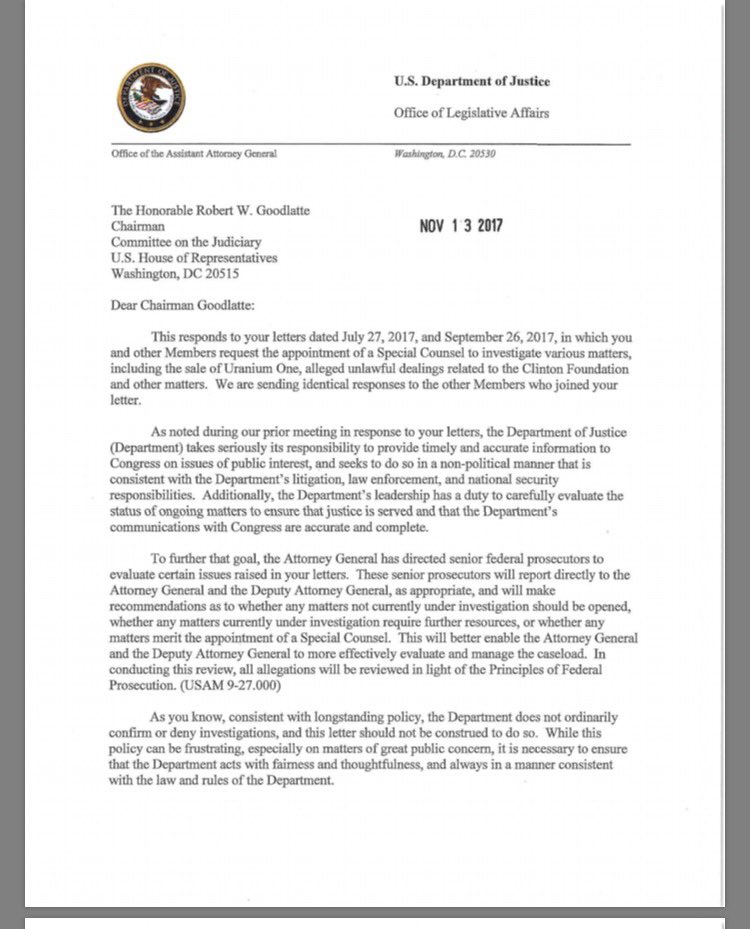That’s the headline in a Washington Post article today, which begins:
Attorney General Jeff Sessions is entertaining the idea of appointing a second special counsel to investigate a host of Republican concerns — including alleged wrongdoing by the Clinton Foundation and the controversial sale of a uranium company to Russia — and has directed senior federal prosecutors to explore at least some of the matters and report back to him and his top deputy, according to a letter obtained by The Washington Post.
Uh-huh. Here’s the letter:
Take note: the letter is NOT written by Sessions, but By Stephen Boyd, an Assistant Attorney General.
Some on the left think this shows Sessions inappropriately bending to political pressure, perhaps to save his job, from Trump and Republicans in Congress. The possible reigniting of a probe of Clinton is likely to draw especially fierce criticism, even as it is welcomed by Trump’s supporters. It certainly was the BIG THING on Fox News last night.
But that is not what is going on.
As the letter points out, certain Republicans on the House Judiciary Committee have requested (by letter) that Sessions look into dealings involving Hillary Clinton, the so-called “Uranium One” scandal in particular. (It’s a nothing-burger, as I explain here). It also wants a Comey investigation for how he handled the Clinton emails.
Sessions, wisely, has no intention of doing either investigation. There is no scandal involving the Uranium One deal. Same with Comey. Both investigations would, if they happened, involve going after one’s political enemies.
Many of the issues raised in the letter are silly, at least as starting points for a criminal investigation. For one thing, many of them are past the statute of limitations for federal crimes, which is generally five years.
Other things that are raised in the Congressional letter are not crimes at all, such as the FBI’s reliance on a dossier for leads in an investigation. It’s unclear why the DOJ would look into whether the FBI relied on a particular piece of evidence in an investigation.
It is also unusual for the FBI to reopen investigations that are closed, particularly without a very good reason to do so. The letters from Congress don’t provide any specific reasons to reopen FBI investigations into Uranium One, Clinton’s emails, and so on.
It is also unusual for DOJ (or the FBI) to investigate its own internal decision making processes absent evidence of wrongdoing. The letters from Congress do not even make specific allegations of wrongdoing by DOJ officials regarding immunity or charging decisions. They also provide no rationale regarding why a special counsel should be appointed. 28 CFR 600.1 limits appointment of a special counsel to cases that “would present a conflict of interest for the Department or other extraordinary circumstances.”
Now, Sessions SHOULD have pointed all this out in his letter above. But he didn’t. Why not? Probably because he’s widely perceived in the Trump Administration as “not a team player” (he hasn’t locked up Hillary, etc). So he can’t shoot down these “investigations”.
But Sessions is going to testify before the House Judiciary Committee today, and these issues was definitely going to be raised. So what was Sessions to do?
Answer: this letter, which is best understood not as a hint to Trump that Sessions will do as the President wants, but as a way of shunting the matter to a mechanism that will enable him not to act—or, to be more precise, that will enable Rod Rosenstein not to act.
“The Department has forwarded a copy of your letters to the IG so he can determine whether he should expand the scope of his investigation based on the information contained in those letters,” Boyd wrote. “Once the IG’s review is complete, the Department will assess what, if any, additional steps are necessary to address any issues identified by that review.”
Translation: “We’re looking at it and we’ll get back to you”
Better translation: “No investigation but we’ll make the motions”
UPDATE: At his hearing today, Sessions is disappointing the Radical Right a little:
Attorney General Jeff Sessions threw some cold water on the idea of appointing a special counsel to investigate various matters related to Hillary Clinton and Democrats, as some Republicans have called for.
At a House Judiciary hearing Tuesday, Sessions stressed the “factual basis” that must be met to warrant a special counsel, as Rep. Jim Jordan (R-OH) grilled him on what Jordan said “looks like” the FBI working with Democrats to push the Trump-Russia dossier.
“‘Looks like’ is not enough basis to appoint a special counsel,” Sessions said.
Jordan has led the charge of GOP lawmakers calling for a special counsel investigation to be launched in addition to Special Counsel Robert Mueller’s Russia probe. On Monday, Assistant Attorney General Stephen Boyd responded to a request by House Judiciary Republicans for a new special counsel in a letter that said senior Justice Department prosecutors would evaluate the matter.
Jordan grilled Sessions on various claims that the Obama-era FBI colluded with Democrats to elevate the dossier put together by ex-British spy Christopher Steele that made various Russian-related allegations about President Trump. Sessions would not say whether the dossier was used by the FBI to obtain warrants to surveil Trump associates, nor would he comment on any hypothetical investigation into Justice Department leaks to the media about the dossier.
Asked by Jordan what it would take to get a special counsel investigation into the dossier or various Clinton-related accusations, Sessions pointed to department policies on the procedure, as well as to the fact that there has only been two special counsel investigations.
“Each of those are pretty special factual situations, and we will use the proper standards, and that’s the only thing I can tell you, Mr. Jordan” Sessions said. “You can have your idea, but sometimes we have to study what the facts are and to evaluate whether it meets the standard that requires a special counsel.”


